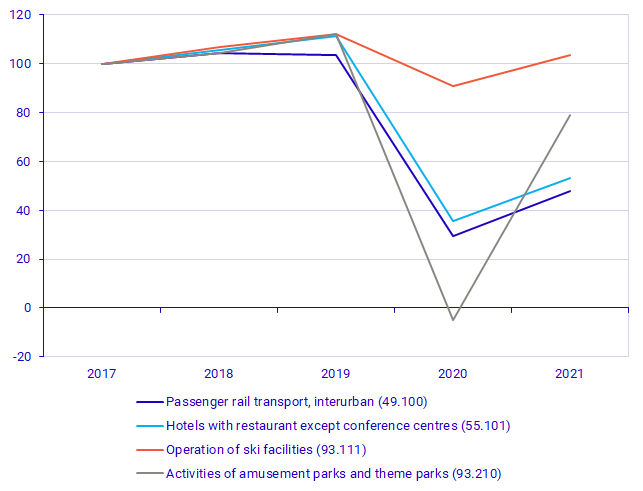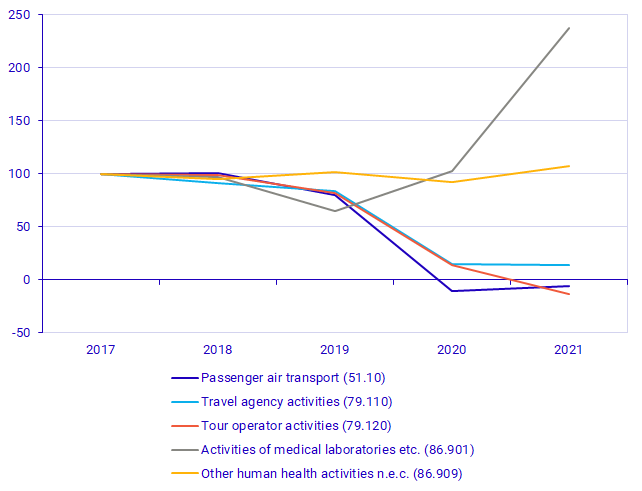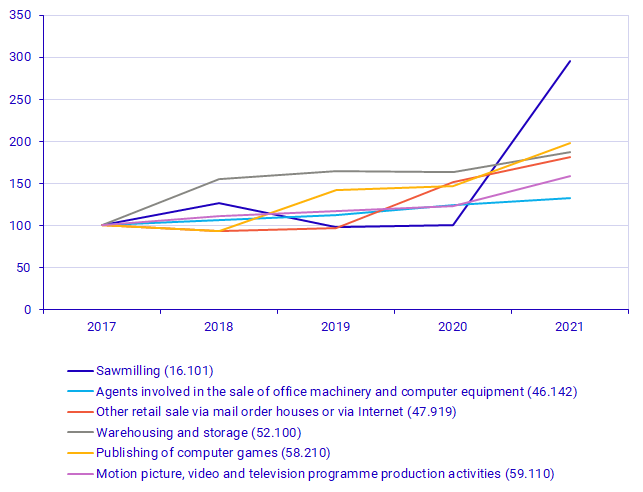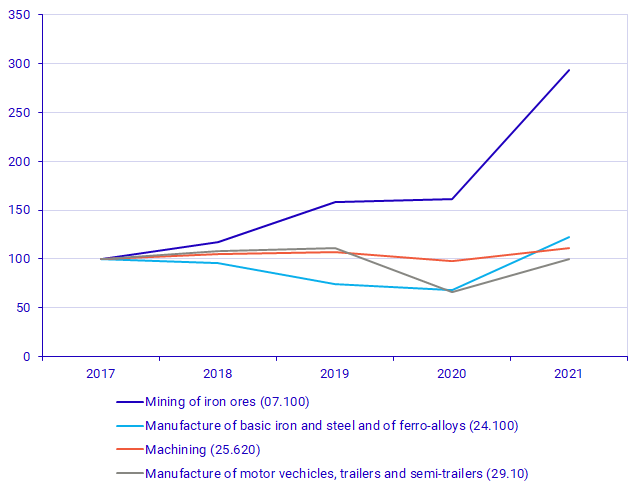Structural Business Statistics 2021
Mostly upside in the business sector during the second year of the pandemic
Statistical news from Statistics Sweden 2023-05-10 8.00
The Swedish business sector recovered strongly in 2021. Value added increased with 12 percent and amounted to SEK 3 015 billion. Some of the industries that increased their value added significantly between 2020 and 2021 were Amusement parks and theme parks, Medical laboratories, Publishing of computer games, Sawmilling, and Mining of iron ores.
2021 was a year marked by growth in many of the industries in the business sector. The growth was mainly due to recovery after the first year of the Corona pandemic, when parts of the business industry were heavily affected. The pandemic also led to changed behaviours in the society, which benefited certain industries. The positive development can also be explained by the on-going structural transformation, where manufacturing enterprises is changing towards electrification, digitalisation, and green technology.
This statistical news shows the recovery from a few different points of view with the help of a time series for value added for the years 2017-2021. Value added can be described as the enterprises’ contribution to GDP (gross domestic product). The value added of an enterprise should cover the costs for personnel, depreciations, financial items, and tax.
Removed pandemic restrictions

The Public Health Agency of Sweden began during 2021 to ease the restrictions imposed due to the Covid-19 pandemic. This allowed amusement parks and ski facilities to reopen. The strongest increase is shown for Amusement parks and theme parks, that went from a negative value added of SEK -65 million in 2020 to a positive value added of SEK 1 061 million in 2021. As travel restrictions were lifted in 2021 the value added for passenger rail transport increased with 62 percent the last year in the time series and amounted to SEK 2 300 million. The industry for Hotels also began to recover and had a value added of SEK 8 289 million in 2021. However, the value added for both railway enterprises and hotels in 2021 were less than half the values for 2019.
Continued impact of the Covid-19 pandemic

The impact of the Covid-19 pandemic was still evident in the aviation and travel industries during 2021. Value added in passenger air transport continued to decline and was in 2021 106 percent lower than the value added for 2017. Tour operators had it even worse, value added was 114 percent lower in 2021 than in 2017. The vaccination and testing activities for Covid-19 meant a boost for laboratories and vaccination centres, which are in industries 86.901 and 86.909 (NACE Rev 2). The medical laboratories performed best, the value added started to grow during the first year of the pandemic (2020), and then increased further and amounted to SEK 3 761 million in 2021.
Changed behaviours

The pandemic forced the society to a change, where new behaviours emerged and seems to persist. The enterprises that can answer to an increased demand are benefited. The sitting at home led, amongst other things, to an increase in streaming of movies and TV-series, which had a positive effect on NACE 59.110. This industry increased with 28 percent between 2020 and 2021, to a value added of SEK 7 662 million. The increase over the whole time series were 59 percent. Publishing of computer games (NACE 58.210), which increased already in 2019, received a further boost and increased with 35 percent between 2020 and 2021 to a value added of SEK 14 595 million. Retail sales over the internet had already increased before the pandemic, and this behaviour was further reinforced in 2021, which had a positive effect on the industries 52.100 and 47.919. Many worked from home and took the opportunity to renovate. This positively affected the sawmills (NACE 16.101), and the value added more than tripled the last year in the time series to a value added of SEK 17 631 million. The increased tendency of working from home also had a positive impact on the commission trade for office equipment and computers.
Structural transformation

The manufacturing industry is in the midst of a structural transformation, on its way towards electrification, digitalisation and green technology. Enterprises in industries that can answer to the demand caused by the transformation will benefit from it. For mining of iron ores and the manufacture of basic iron the development has benefited from pure price effects, which are due to global inventories of metals being historically low during 2021. In addition to this, the rampant metal prices have been reinforced in part by the transformation to green energy, and the increased demand in the Swedish technology industry for aluminium and copper in particular.
The industry for mining of iron ores has had a positive development from 2018 and onwards, but the significant increase came in 2021 when value added increased with 82 percent (compared with 2020) to SEK 34 516 million. The industry for manufacture of basic iron and steel had two harsh years after 2018 but recovered well to a value added of SEK 16 832 million in 2021. The industry for machining had a more even development during the time series and the value added amounted to SEK 17 139 million for 2021, which is 11 percent higher than 2017. The industry for manufacture of motor vehicles, trailers and semi-trailers declined heavily during the first year of the pandemic. The industry increased during the last year of the time series with 51 percent compared with 2020 to a value added of SEK 64 951 million, which is equivalent to the level of 2017.
Definitions and explanations
Structural Business Statistics is the only survey that is based on the annual accounts of all non-financial enterprises in Sweden.
All information in this item of statistical news is reported in current prices. All comparisons have been made with final data for 2020.
Value added: Actual production minus costs for purchased goods and services, except salaries, payroll taxes and the costs of goods for resale (because only the trade margin for these is included in the production value). Value added can also be referred to as the contribution to GDP (gross domestic product).
Business sector: Enterprises conducting business activities in Sweden regardless of legal form. Businesses with financial activities and housing cooperatives are not included in the Structural Business Statistics. Public administration activities are also not included.
NACE Rev2.: Industrial classification for classifying enterprises into industries according to the activity they conduct. The Swedish equivalent is SNI2007 (Svensk näringsgrensindelning).
Information on the quality of the statistics, production methods, frequently requested tables, charts, and more is available on the Statistics Sweden website under Structural business statistics (scb.se).
Next publishing will be
The next item of statistical news in this series is scheduled for publication on 2023-12-04 at 08:00.
Statistical Database
More information is available in the Statistical Database
Feel free to use the facts from this statistical news but remember to state Source: Statistics Sweden.
